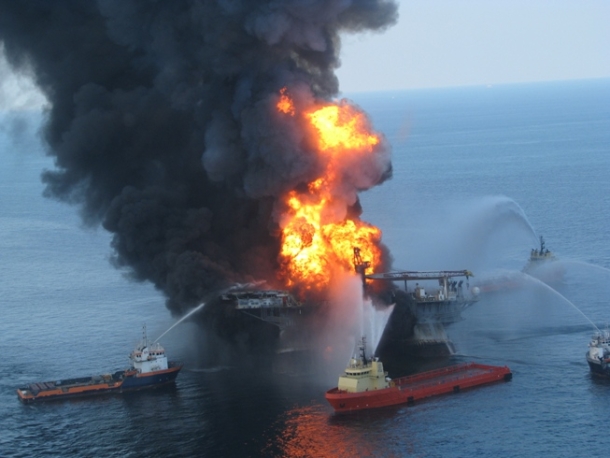Submitted by Anne Landman on
 Back in July, 2000, British Petroleum launched a high-profile, $200 million public relations ad campaign designed by Ogilvy & Mather to position the company as environmentally-friendly. The company introduced a new slogan, "Beyond Petroleum," and changed its 70 year-old, sheild-style logo to a new, cheerful green and yellow sunburst. To many, the "Beyond Petroleum" campaign has always been ludicrous. After all, not only did it pitch BP's smallest energy sector while ignoring its major one, but BP's investment in extractive oil operations dwarfed its investment in renewable energy. BP spent a mere $45 million in 1999 to buy a solar energy company called Solarex -- a microscopic acquisition compared to the $26.5 billion it invested to buy ARCO to expand its oil drilling portfolio. BP is also the company behind the environmentally controversial (and some would say disastrous) oil sands project in Alberta, Canada. Now, in the wake of the massive oil spill in the Gulf of Mexico, BP's greenwashing campaign looks even less slick. The company's hypocrisy and greenwashing have risen to the surface, and are spreading uncontrollably.
Back in July, 2000, British Petroleum launched a high-profile, $200 million public relations ad campaign designed by Ogilvy & Mather to position the company as environmentally-friendly. The company introduced a new slogan, "Beyond Petroleum," and changed its 70 year-old, sheild-style logo to a new, cheerful green and yellow sunburst. To many, the "Beyond Petroleum" campaign has always been ludicrous. After all, not only did it pitch BP's smallest energy sector while ignoring its major one, but BP's investment in extractive oil operations dwarfed its investment in renewable energy. BP spent a mere $45 million in 1999 to buy a solar energy company called Solarex -- a microscopic acquisition compared to the $26.5 billion it invested to buy ARCO to expand its oil drilling portfolio. BP is also the company behind the environmentally controversial (and some would say disastrous) oil sands project in Alberta, Canada. Now, in the wake of the massive oil spill in the Gulf of Mexico, BP's greenwashing campaign looks even less slick. The company's hypocrisy and greenwashing have risen to the surface, and are spreading uncontrollably.
Beyond Disastrous
 The oily environmental disaster in the Gulf has drawn closer scrutiny of BP's record, and it reveals that the company is no stranger to major accidents. Pro-Publica reports that BP has been at the center of some of the worst oil and gas-related disasters in the U.S.
The oily environmental disaster in the Gulf has drawn closer scrutiny of BP's record, and it reveals that the company is no stranger to major accidents. Pro-Publica reports that BP has been at the center of some of the worst oil and gas-related disasters in the U.S.
In 2005, a major explosion destroyed a gasoline-filled tower at BP's Texas City, Texas refinery, killing 15 people and injuring 170 more. Investigation revealed that BP had ignored its own protocols for operating the tower, and a warning system had been disabled. BP pleaded guilty to federal felony charges and shelled out more than $50 million in fines.
About a year after the Texas City accident, around 4,800 barrels of oil leaked into the snow around a pipeline in Alaska's Prudhoe Bay. BP had been warned by one of its own quality assurance specialists that they could expect a potential catastrophe from the corroded pipeline, but the company ignored the reports until it was too late.
In May, 2008, BP was one of eight big oil companies to settle a lawsuit brought by more than a hundred public water providers, who charged that the companies' activities led to widespread contamination of public groundwater sources with methyl tertiary butyl ether, or MTBE, a gasoline additive. The companies jointly paid $423 million in cash, and agreed to pay 70 percent of future cleanup costs over the next 30 years. The suit claimed the oil companies used MTBE even though they were aware of the environmental and health risks the chemical posed.
The U.S. Department of Justice has also charged BP with manipulating the market price of propane. BP agreed to pay over $300 million in fines in the case.
Spill, Baby Spill
 Despite, or maybe because of, its history of fatal accidents, environmental disasters, fines and public deceit, BP is still trying to greenwash its image. Its Web pages are filled with bogus statements, like "We try to work in ways that will benefit the communities and habitats where we do business -- and earn the world's respect."
Despite, or maybe because of, its history of fatal accidents, environmental disasters, fines and public deceit, BP is still trying to greenwash its image. Its Web pages are filled with bogus statements, like "We try to work in ways that will benefit the communities and habitats where we do business -- and earn the world's respect."
While more people are starting to see through this campaign of denial, BP still has a few cheerleaders, like failed vice presidential candidate-turned-Fox News commentator Sarah Palin, who on April 30 posted a buck-up piece in support of more domestic -- and even offshore -- drilling on her Facebook page.
If they haven't already, BP's disingenuous words of support for developing low-carbon, renewable energy sources will increasingly fall on deaf ears as the country' attention remains riveted instead on the desecration of one of the nation's most beautiful and valuable natural resources: the beleaguered Gulf coast.

Comments
Steve Palla replied on Permalink
BP
Christopher Kennedy replied on Permalink
Beyond Petroleum what a farce
Anglesey Cottages replied on Permalink
Accelerate move away from petroleum
Mark Jacobs replied on Permalink
Where to spend all the money in penalties???? I've got an idea.
Avro Arrow replied on Permalink
Solar and Wind? What the hell for?